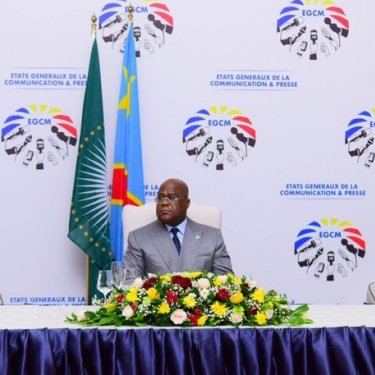National convention’s decisions could herald new era for journalists in DRC

Reporters Without Borders (RSF) welcomes the main conclusions of a five-day “national convention on communication and the media” in the Democratic Republic of Congo and urges the authorities to lose no time in implementing the proposed major reforms, which RSF and its Congolese partner, Journalist in Danger (JED), have been recommending for years.
If the convention held in Kinshasa from 25 to 29 January quickly leads to action, it will mark a turning point in the history of the media in the DRC. The proposals in the convention’s final report, of which RSF has obtained a copy, include most of those recommended by RSF and JED.
Abolishing prison sentences for press offences (one of the 1996 press law’s provisions) heads the list of 80 proposals that have been adopted. Communication and media minister Patrick Muyaya told RSF that a bill to this effect should be presented quickly. A moratorium on arrests of journalists in connection with their work, another of the measures recommended by RSF and JED, is also high on the list. President Félix Tshisekedi, who presided over the opening and closing of this convention, reiterated his desire to guarantee journalists’ safety by creating a dedicated alert mechanism, while at the same time stressing the need to foster a more professional and responsible press.
“This national convention paves the way for reforms that could improve the practice of journalism in the DRC in concrete ways,” said Arnaud Froger, the head of RSF’s Africa desk. “We welcome the main recommendations that were adopted and we encourage the authorities to implement the long-awaited reforms as soon as possible. The path chosen to strengthen the protection of journalists and improve their working environment while strengthening the media’s professionalisation and viability is the right one.”
Other recommendations include creating a support fund for the press, abolishing certain taxes and royalties the media pay to the communication ministry and the National Intelligence Agency (ANR), extending the powers of the High Council for Broadcasting and Communication (CSAC) and turning the state-owned radio and TV broadcaster RTNC into a real public service media. A committee is to be created to monitor implementation of the proposed reforms.
According to the annual report that JED published in December, nearly half of the 110 press freedom violations registered in the DRC in 2021 involved a threat to journalists’ physical safety. Half of the violations took place in eastern provinces, especially Ituri and Nord-Kivu, which have been placed under a state of emergency.
The DRC is ranked 149th out of 180 countries in RSF's 2021 World Press Freedom Index.



